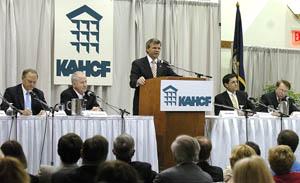Five at Sloan forum
Published 12:00 am Thursday, April 26, 2007

- Joe Imel/Daily NewsGov. Ernie Fletcher (center) speaks Wednesday during a gubenatorial candidate forum at the Kentucky Association of Healthcare Facilities annual meeting at the Sloan Convention Center. From left is Dr. Steve Henry, Bruce Lunsford, Sen. Daniel Mongiardo and House Speaker Jody Richards.
Three doctors, the founder of a health-care company and Bowling Green’s own Jody Richards spoke Wednesday afternoon to owners and operators of Kentucky nursing homes at the Sloan Convention Center, outlining their ideas on long-term health care policy.
All of the speakers seek the office of governor for themselves or their running mate. Gov. Ernie Fletcher was the only one of three Republican candidates to attend. Three Democratic candidates for governor – House Speaker Jody Richards, former Lt. Gov. Steve Henry and businessman Bruce Lunsford – and former State Sen. Daniel Mongiardo, also a Democrat and running mate for former Lt. Gov. Steve Beshear, attended. Fletcher, Henry and Mongiardo are all physicians, and Lunsford is cofounder of the hospital and nursing-home company known as Kindred Healthcare.
Candidates were invited to speak at the Long Term Health Care Forum, part of the Kentucky Association of Health Care Facilities spring training conference, which ran from Tuesday until today.
The conference drew about 400 long-term care providers from all over the state, said Steve McClain, director of Communications and Membership Development at KAHCF.
Fletcher said he’s already worked with nursing-home owners to set current policy, and asked voters to keep a health-care team that he said has done an excellent job in the last four years.
Lunsford pointed to his background in the health care business, saying he understands business owners’ needs and wants to give them predictability in dealing with government.
Richards said he will announce his health care plan next week, but especially wants to improve access to long-term care insurance by offering incentives to buy it.
Mongiardo called for a wholesale revision in medical information management, saying health care is the only major industry still entirely paper-based.
“All health care is, is information,” he said.
Until efficiency is improved by streamlining documentation and record transferral, no amount of money will fix the system, Mongiardo said.
Henry said he wants to create a state surgeon general’s office to oversee and coordinate all health-related agencies. He called for half the proceeds of expanded gambling to go to health care, with the other half going to fund education.
Answering a question about how to fund health care in general and long-term care in particular – a question asked of all candidates – Henry said it saves money to keep patients at home as long as they can stay there. Putting more state money into Medicare would attract several times that investment in federal matching money, he said.
Mongiardo said health care and education together make up 80 percent of the state budget, so without more revenue any increase in Medicare would come from education. To prevent that, he called for a search for government efficiency and expanded gambling, with some proceeds going to health care.
Richards said he would “reprioritize” state spending to find more for health care, but doesn’t want to pit home-care and long-term care providers against one another for the same pot of funding.
By contrast, Lunsford said home care is the least financially efficient way to provide health care, and that to cut long-term care costs Kentuckians must be urged to change their behavior, especially smoking.
Fletcher said his administration has already cut “waste, fraud and abuse,” and that health care is adequately funded.
Asked whether they would support changes in the law governing medical malpractice lawsuits, Fletcher and Henry said they approved of caps on non-economic damage awards – but Henry said those aren’t politically feasible within the next few years, and joined Mongiardo, Lunsford and Fletcher again in supporting establishment of review panels to weed out frivolous lawsuits.
Mongiardo said, however, the costs generated by frivolous suits are minuscule beside the actual cost of real malpractice, and urged systemic improvements to prevent malpractice issues in the first place.
Richards said the General Assembly’s Program Review Committee has found that malpractice insurance rates don’t substantially fall when caps are placed on non-economic damages.
Questioned on what health-care reforms each candidate would support, Richards reiterated his call for increased access to long-term care insurance.
Lunsford said universal health care is needed in Kentucky, and urged preventive care for the indigent and uninsured.
Fletcher said his administration has saved money through better tracking of health care, cutting down on overuse of drugs. The most important factor in his policy is government collaboration with the industry, he said.
Henry said universal health care is not a real option, and that any candidate who says it is, is not being honest. He urged improving care for children and seniors, and charging the working poor on a sliding scale.
“We have universal health care, don’t we?” Mongiardo asked the crowd, then explained: “People who don’t have insurance go to emergency rooms.”
That system is terribly inefficient, and should be changed by giving incentives to create better care options and for the poor to get preventive care, he said.




